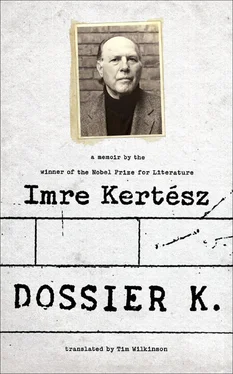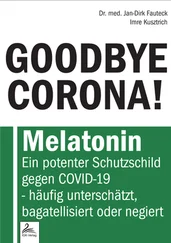I don’t believe it was that complicated. Both of us were lonely and forlorn; we needed each other. Later on we simply stayed together even when the absolute need may have disappeared …
How did she end up in prison? What was the reason for arresting her?
You have some very droll questions. We are talking about 1952, the baleful height of the Rákosi era. Why did they arrest anyone during that period? Simply because the sphere of authority of those who made the arrests was unlimited and so they could arrest anyone at any time. A citizen living in a dictatorship who happens not to be in prison at that moment is merely a prisoner released on bail. In that context, the case itself, the “charge” on the pretext of which a person is arrested, is an anecdote of purely secondary importance.
And just as one fine day she was arrested, so on another fine day she was released .
In the wake of a speech made by Imre Nagy in July 1953, during his brief first period as premier, when the internment camps were opened up and deportees were released from the compulsory places of residence that were assigned to them.
Where did you yourselves live?
In rented accommodations, but it’s not worth going into the story at this nadir. A rough and very boring period ensued that was preoccupied mainly by the foolish cares of sheer survival.
Until, one fine summer morning you “traversed half the city … with a four-wheeled tow cart,” as one reads in The Union Jack.
It so happened that through some staggering bureaucratic marvel the authorities handed back to Albina the apartment that had been unlawfully sequestered from her. We piled the scanty appurtenances of our household onto a handcart and set off from the rented place on Lónyay Street in the Eighth District of Pest to take possession of the apartment on Török Street. 20
The same as the one in which, roughly twenty-five years later, the “Old Boy” stood before the filing cabinet and thought .
Exactly. Of course, the filing cabinet was the product of an organic development over the ensuing decades.
A fairly intensive development if one considers merely the metamorphoses of the timbers, which had originally served as the linen drawer of a former divan-bed, then as a bookcase put together from that, as one can read in Fiasco. But let’s get back to the chronological order .
That won’t be easy.
Why?
Because it doesn’t signify anything, The device of a sequence, of linearity, won’t allow us to capture that darkest yet also most productive period of my life in the trap of narratability.
That is the period about which …
About which, as you yourself remarked not so long ago, I am unable to give an account in the language of rationality.
So, we are still stuck at the question of what happened to you in the L-shaped corridor .
No, we’ve already covered that. Like a sleepwalker I followed an inspiration that lured me further and further from the everyday and about which I could have no idea where it would lead ultimately. I stepped outside my history and was alarmed to notice that I was on my own. It did not make things any easier that around this time we were living off Albina’s earnings alone.
I can roughly understand your anxieties. “I always had a secret life, and that was always the real one,” you write in Galley Boat-Log. 21 Much earlier you recorded more impassively, even a little bit cynically: “The idea that anyone at all might understand my secret occupation and the way of life it entails is so alien to me that I am quite capable, even unprompted, of joking about myself to anybody else without feeling in the least ridiculous.” 22
Yes, after a while one toughens up. On top of that, I had to settle in for the long haul.
It’s interesting that right from the start you pictured yourself as a sort of “outlaw writer.” As someone living in a hostile environment and engaged in a secret activity. What’s the explanation for that?
Quite simply the fact that I was living in a hostile environment and engaged in a secret activity.
Don’t you think that your general distrust may have been founded on a lack of self-confidence?
It’s possible. Whatever it was founded on, I could not have imagined, and even today could not imagine, a “legal” art which was on harmonious terms with its social milieu.
Which makes it quite superfluous for me to pose the question: Did it never occur to you to get going on what is regarded as the “regular” route of publishing shorter-length stories to begin with in order to enter literary life, so-called, and generally just get your name more widely known?
That is, indeed, a prototypically superfluous question … I can’t even say that I didn’t wish to enter so-called literary life; the idea of entering it, that I could enter or might enter, simply didn’t cross my mind … indeed, it didn’t even cross my mind that what I was engaged on at home, between four walls, was what is called literature, and that literature had an organizational structure: the Writers’ Association, the Ministerial Literary Department or Section, the Book Publishers’ Administration, the Party artistic and literary … OK, I’ll leave it at that. All I wanted to do was indicate that I was nevertheless well aware, incidentally, that we were living in a totalitarian state, and that had its own characteristics that it does no harm to think through if one is going to write a novel … indeed, that novel-writing will stall until one does think them through. All the more so, as it was precisely those characteristics that I wanted to write about, and right there one comes up against the first big question: Is that at all possible?
If I understand you right, it’s a matter of one’s world-view .
Precisely. And that is the way in which it presented itself to me: If power is totalitarian, and the accommodation to it is total, then for whom is one to portray man dominated by totalitarianism? And why should one portray him so dismissively, so negatively? For what kind of mysterious entity would the novel-writer work? Who would be left and be in a position to judge outside of the totality; indeed, this being a novel, who would derive amusement and learn from the work, and what is more, draw from it the conclusions about works that were to come ? Who would be that personified or divinely abstract Archimedean centre of mass? The absurdity lies in the fact that since God died, there has been no objective gaze; we live in a state of “panta rhei”: everything is in flux, there is no foothold, and yet we still write as though there were, or rather as if, despite all appearances, there still existed a viewpoint sub species aeternitas , the divine standpoint, or the “eternal human” where the resolution of this paradox lies.
I begin to understand why you said that you needed time, more time, in fact a great deal more time .
Yes, it’s not sufficient simply to pose these questions; you first have to get to them.
I note that the unfavourable reality did not seem to have any influence on your intellectual activities. From The Union Jack, for instance, we learn that in the midst of living with the vexations of rented accommodation and all the other difficulties your life was turned upside-down most of all by a book that you found by complete chance among the bric-a-brac left behind in the Török Street apartment. Indeed, you go so far as to say that the book a person has need of almost unfailingly comes to hand, whether by design or fortuitously . 23 That was how you came across The Blood of the Walsungs …
Читать дальше












